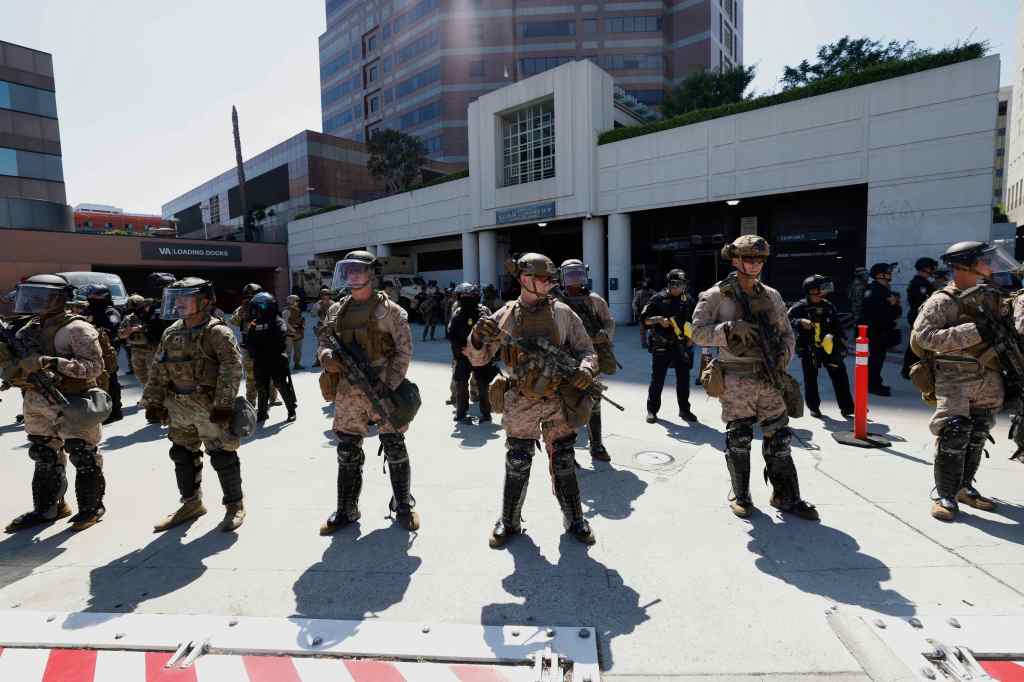I am a native Angeleno, born at the Good Samaritan Hospital in Los Angeles. High school, college, law school, all in the city of my birth. Although I now live in Pasadena, the City of the Angels is where my heart will always be. That is why the sight of my Marine and Guard comrades on the streets of my hometown has given me great pause. (The views expressed here are my own and not those of the California Military Department or the Los Angeles County District Attorney’s Office, where I have worked.)
President Trump authorized the federal deployment of several thousand servicemembers from the California National Guard and a battalion of United States Marines to Los Angeles. This action was taken despite opposition from both the governor of California and mayor of Los Angeles, in response to protests related to immigration enforcement actions. The Los Angeles Police Department has assured the community that it can control the protests without federal intervention. What is the basis in law for this?
The Posse Comitatus Act, 18 U.S.C. § 1385, prohibits our Armed Forces from acting as a domestic police force unless doing so is “expressly authorized by the Constitution or Act of Congress.” The Insurrection Act, 10 U.S.C. § 253, gives limited authority to the president to deploy federal troops to quell “any insurrection, domestic violence, unlawful combination, or conspiracy” against the United States government and to execute federal civil rights laws when they are obstructed. That authority has seldom been used in our nation’s history. Past deployments of federal troops for domestic law enforcement purposes have happened when state governors have defied federal authority or where state officials asked for federal assistance: President Eisenhower’s federalization of National Guard troops to enforce the Supreme Court’s order in Brown v. Board of Education to desegregate schools, and President Johnson’s federalization of Guard troops to protect civil rights marchers in Selma.
The last major deployment of federal troops domestically occurred here in Los Angeles during the 1992 riots, at the request of Gov. Pete Wilson, and pursuant to the Insurrection Act. That deployment followed widespread violence and looting of businesses, the burning of entire blocks of homes and businesses, and many civilian fatalities. Notwithstanding reports of property damage and violence, the current situation in Los Angeles has been limited in scope and appears to have ended. There have been no reported deaths, and protest activity was mostly in the civic center area of Los Angeles.
Deployments over the objections of state officials have been when local officials defied court orders. Here, the Los Angeles Police Department and the state of California have not only not asked for outside assistance to control the protests but have even suggested that the deployment of military troops would be more likely to exacerbate, rather than lessen, the risk to the community.
Under the Insurrection Act, the president may federalize National Guard forces without state consent. The deployment of the California National Guard and active-duty military personnel as domestic law enforcement should be in compliance with the Posse Comitatus Act. Allowing our military to be used for law enforcement is fraught with peril. It should seldom be called upon to serve as a domestic police force. Soldiers are trained to fight and destroy the enemies of our country. Most receive minimal training in enforcing the law while respecting constitutional rights. Deploying them to incidents of civil unrest creates risks for both civilians and soldiers. It lessens the focus on their core missions, including defending the country against threats from hostile foreign powers and, in the case of the California National Guard, responding to natural disasters.
Former Pasadena Mayor William Paparian served in the Marine Corps during the Vietnam War and serves as a captain judge advocate in the California State Guard and as a Los Angeles County deputy district attorney.
